Index
J.A.J.A.
[ Index ]
[ Story ]
[ Characters ]
[ Status ]
[ Terms ]
[ Staff ]
[ Tools ]
[ Other Info ]
[ E-Mail ]
 Director
DirectorThe Director fills in an exposure sheet for every moment of screen time. Decisions are made by the director to shape all the work. |
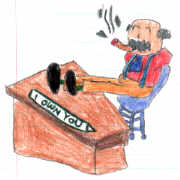 Producer/Executive Producer
Producer/Executive ProducerThe Producer is the individual responsibility for the overall development of the animated film. He selects personnel, |
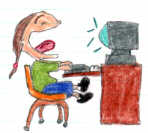 Writer/Screenplay
Writer/ScreenplayThe Writer is assigned or chooses the subject, defines the characters, and creates a base of the story. The Screenplay shapes the story line and dialogue and writes the script for the story containing all events, movements, and much more. |
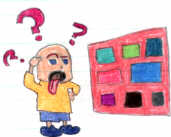 Storyboard
StoryboardThe Storyboard Artist(s) breaks down the story into component scenes. The storyboard provides a visual system for making a detiled analysis of the film's development. Storyboard includes detialed study of chatacter appearance and movement, detailed work-up of backgrounds and a delineation of scenes and sequences within scenes. |
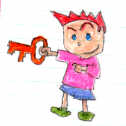 Keyframers (Key Animators)
Keyframers (Key Animators)The Keyframers take from the storyboard and create all the main pictures of different scenes. These are very crucial for the aniamtors, or else they would have nothing to work off of. |
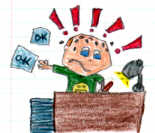 Animators/Assistant Animators
Animators/Assistant AnimatorsThe Animators make all the inbetweens of the keyframes that the Keyframers made. This is where movement is created in animation. This job is one of the longest (in my opinion) in making an animated film. |
|
Checkers The Checkers are the ones who look through every frame of animation seeing where there are any problems to be fixed. These problems are snet back to the animator that was working on that section. They also check to see if everything matches the exposure sheet. |
|
Inkers The Inkers trace the lines from an animation frame to the cels. some Japanese Animating companies use special machines to copy the frames onto the cels without having to worry about getting the frames exactly the same as on the cels. |
|
Cel Painters (Opaquers) The Cel Painters are the ones who also have a long a job. They have to paint every cel perfectly or it will show in the final output of the film. |
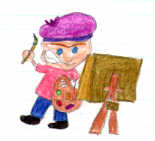 Background Artists
Background ArtistsThe Background Artist gets to make all the beautiful scenes that are seen throughout the film. |
|
Track Analysis The Track Analysis makes a bar sheet from the soundtrack. All words, beats, and music are identified with the utmost detail and precision. |
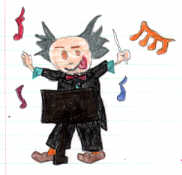 Music/Composer
Music/ComposerThe creator of all background music and/or the composer of any vocal tracks that may appear in the animated film. Usually any vocal tracks that appear in the animated film is done by a well known group or a group that is created for the film. Any musician for the film cannot create any music alone. They must work with the whole film staff to agree apon a song or track. This is very important for the animators to fit certain scenes that have a background track or a background song. |
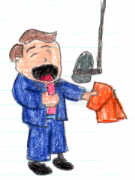 Voice Artists
Voice ArtistsThe Voice Artists provide the kawaii voice to the cutest character and to the big grunts of the villian's dialogue. You can't have dialogue in a animated film without someone to speak those lines. The voice artists help give the characters their character. Like the musicians and composers, the voice artists must also work with the whole animation staff. |
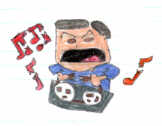 Sound Artists/Editor
Sound Artists/EditorThe Sound Artists adds all the sound effects to the animated film, giving it more life. They also set the dialogue and music tracks to the animated film. Usually the Sound Effects are added last in an animated film. The Sound Editor fixes the tracks, dialogue, and sound in the animated film that have been set wrong by the sound artist. The Sound Editor adds any extra necessary sounds that were not put in. |
|
Filming One of the final processes in an animated film making. The filming takes snapshots of every frame into a camera. The film is than edited by a film editor who splices, cuts, and pastes all the footage into one final product. The Filming part requires patience in making the film. Each frame must be set to every background without any noticable incorrect movements. If there are any, then a reshoot is required for that scene that is incorrect. Now days, computers are helping in the creation of animated films. What is done be some groups is that each frame is put into a computer and is screened on the computer to see for any mistakes. If there are none, then the recording is put to film or video. Small groups put the footage to a video cassette and then have labs transfer their video into a film strip. |